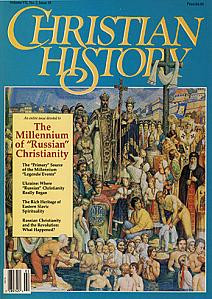Avvakum, the Old Believer, Wrote a Masterpiece in Exile
ON THIS DAY, 20 November 1620, Avvakum Petrov was born in Russia’s Niznij Novgorod area. He became a notable spiritual leader and wrote a vivid autobiography, describing his home life in these words:
My father was the priest Peter, my mother Marija, as a nun Marfa. My father was given to hard drink, but my mother fasted and prayed zealously and was ever teaching me the fear of God. Once I saw a dead cow at a neighbor’s, and that night I arose and wept much over my soul before the icon, being mindful of death and how I too must die. And from that time I grew accustomed to praying every night. Then my mother was widowed and I, still young, orphaned; and we were driven out, away from our kin.
He married a godly girl, became a deacon, and then an archpriest. He wrote of his career in the ministry: “I had many spiritual children; up to now it would be about five or six hundred.”
In 1652 Nikon became Patriarch of Moscow. He and Tsar Alexei I wanted to modernize Russia, and their “reforms” included introducing Roman rituals, such as blessing with three fingers instead of two. Most Russians considered the Russian Orthodox church the one true church. They saw the innovations as heretical and destructive of the pure faith. Avvakum and many others refused to go along with the changes. “He [the Patriarch] seeks to find wisdom in intellectual controversy—I seek it in tears and with prayers at the feet of Christ,” wrote Avvakum. The Patriarch resorted to cruel persecution. Avvakum wrote, “They were trying to build up and strengthen the faith with the aid of whips, fire and gallows! Which of the apostles taught them this?”
Those who opposed the changes became known as “Old Believers.” They looked to Avvakum for leadership. Because of the Tsar’s former friendship with Avvakum, he was exiled with his faithful wife and children rather than being executed. His biography is largely the story of their terrible sufferings and God’s miraculous assistance. They were reduced at times to eating dead animals that wolves would not touch. Two of his sons died. When Avvakum spoke out against brutality, he was flogged and chained overnight in a fall rain. Afterward he was flung naked into a pit. Despite the cold, he was able to write, “God kept me warm without clothes!” For fourteen years he was imprisoned above the Arctic Circle in a sunken hut. Friendly guards smuggled out his letters, with advice such as this: “Let us patiently endure whatsoever the Nikonians may do to us; let us rejoice, for Christ is our joy.”
When Tsar Alexei died, Avvakum appealed to his successor for relief. Tsar Feodor III indignantly ordered him to be executed. On 14 April 1672 he was locked in a log cabin with other believers and burned alive.
—Dan Graves
----- ----- -----
For more on the fascinating thousand-year history of Christianity in Russia, read Christian History #18, The Millennium of “Russian” Christianity






